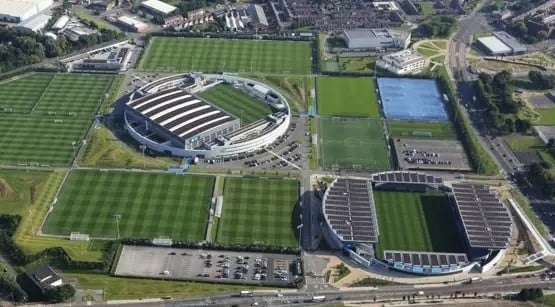
Reigning Premier League champion Manchester City has unveiled plans to install 10,887 solar modules at its state-of-the-art City Football Academy training facility.
The footballing giant confirmed it is seeking planning approval from the Manchester City Council to install the panels, capable of generating up to 4.39GWh of renewable energy each year.
The club said this would be enough renewable energy to completely offset the City Football Academy’s annual usage, with additional renewable energy being supplied to the 53,400-seater Etihad Stadium.
More than 3,000 modules will be located on the roof of the 7,000-capacity Joie Stadium, home to Manchester City Women, while a further 3,942 will be located on the roofs of other facilities on site, such as the First Team and Academy Building.
An additional 3,830 panels will be installed on frames over footpaths and pitch-side areas of the City Football Academy.
The Club confirmed that subject to planning approval, the panels will be fully operational by the end of 2024 and will be installed and managed by Manchester-based renewable energy developer Clearvolt.
Commenting on the announcement, the Club’s head of sustainability, Pete Bradshaw, said: “It is with great excitement that we can reveal our plans to completely offset the power required to run the day-to-day operations of the City Football Academy by becoming one of football’s largest producers of self-supplied, renewable energy.
“As we look ahead on our roadmap to being net carbon zero by 2030, we know that the production and consumption of renewable energy has an incredibly important role to play, which is why we are delighted at the prospect of installing over 10,800 solar panels at our home in Manchester.”
London’s Olympic Stadium’s solar aspirations
Several stadiums across England have turned to solar to reduce their carbon emissions. One high-profile case is the agreement between Octopus Energy and Arsenal, signed in 2017, in which the energy supplier would power the 60,000-seater Emirates Stadium through its significant array of solar farms.
Last year (6 March), plans were unveiled for the 66,000-seater 2012 Olympic stadium, home to West Ham United, to install a solar PV membrane on its roof.
The project is expected to cost around £4 million over two years, with the stadium’s owner, London Legacy Development Corporation (LLDC), hoping to generate energy by the end of 2024.
Once operational, the solar modules will generate around 3,000,000kWh annually at the London Stadium. The feasibility study is set to cost around £60,000, according to LLDC.

